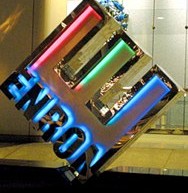Leadership Means Taking Ethical Responsibility

From today's Wall Street Journal (online subscription required):
Scrushy Is Convicted in Bribery CaseNaturally, he'll file an appeal. ButI'm guessing his Houdini days are over. When he talked his way out of a conviction last year, against all courtwatchers' odds, that was a surprise. This verdict isn't.
Prosecutors Savor Victory
Over HealthSouth Ex-CEO
After '05 Fraud Acquittal
By VALERIE BAUERLEIN
June 30, 2006; Page A3
HealthSouth Corp. founder Richard M. Scrushy was convicted of paying $500,000 in bribes in return for a spot on a state regulatory panel, a victory for the federal government a year and a day after it failed to pin a massive accounting fraud at the health-care company on him.
The guilty verdict on all six charges against the 53-year-old Mr. Scrushy, including bribery, conspiracy and mail fraud, could put him behind bars for as long as 20 years, though the judge has wide discretion on sentencing. Prosecutors and defense lawyers are likely to argue over how to weigh factors such as Mr. Scrushy's background and the size of the contributions for which he was convicted. Sentencing isn't expected until this fall at the earliest.
The Montgomery, Ala., jury also convicted former Alabama Gov. Don Siegelman on 10 political-corruption-related counts, six of them linked to Mr. Scrushy. During the two-month trial, prosecutors alleged that Mr. Scrushy arranged two hidden $250,000 payments to a lottery campaign backed by Mr. Siegelman, who put the then-chief executive of HealthSouth on a board that approves hospital-construction projects. The charges weren't related to the accounting fraud.
It wasn't clear what swayed jurors after 11 days of deliberation, or ended a deadlock that emerged last week. Mr. Scrushy's defense team clearly failed to win over the jury with its strategy of comparing him to civil-rights icons who suffered injustice. In his closing argument, Fred D. Gray, who represented Rosa Parks when she was arrested in 1955 for refusing to give up her seat on a Montgomery bus, quoted a favorite Biblical passage of Martin Luther King Jr., adding that an acquittal of Mr. Scrushy would mean that "justice will run down like water and righteousness as a mighty stream."
Federal prosecutors denounced the rhetoric as a racially motivated attempt to influence the jury of seven African-Americans and five whites, the same composition as the jury that acquitted Mr. Scrushy last year. They alleged that Mr. Scrushy had used his money and power to gain political influence that helped fuel HealthSouth's growth. Mr. Scrushy was forced out at HealthSouth when the accounting fraud surfaced in 2003.
Charlie Russell, a spokesman for Mr. Scrushy, said the former HealthSouth CEO was "shocked" by his conviction.
This is a business and leadership blog. Leadership in my view requires ethical conduct. True, it's possible to be a very effective corrupt, destructive or even evil leader: history's pages are replete with examples. I don't claim to be perfect or to have led a perfect life, but the best thing for Mr. Scrushy to do is take his medicine, admit what he's done wrong, take responsibility and change his ways.
Prosecutor's do get things wrong, and what he's been accused of doing may not exactly correspond with whatever wrong he's done. But in the bigger picture, there doesn't seem to be any doubt he's been quite the accomplished crook. Now that he's been convicted, in spite of a very well financed defense, it's time to get a little more real and a bit more humble.
Leadership, of course, means not committing crimes in the first place. Scrushy's apparent failure to take personal responsibility says to me he's unreformed and unworthy of future leadership responsibility. Maybe he'll be exercising some leadership in the penitentiary courtyard.
In what looks like a growing theme for my recent writings, let's take another look at his crime: he was convicted of half a million in bribes to corrupt a regulatory agency. Rather blunt, but we all know that we in the business community have been buying regulatory access, through legal and some illegal menas, for a long time. We have the money; corporate profits are through the roof nationwide. Politicians want money and they write the rules. We make deals consumers don't see or understand, deals smaller competitors can't fight against because they lack our financial leverage and access to politicians.
We tell ourselves we have to do it to protect our shareholders and companies. But the regulatory, anti-competitive protection we buy (telecoms against net neutrality), the corruption we abet in the public sector. . . these things carry costs. Squelching inovation husst the larger economy and community; it 's the startups and renegades who fuel new innovation and industry creation. Corruption scandal after corruption scandal will eventually bring about anti-corporate backlash in the electorate: it's happened in American history before. I suppose, like Scrushy, we could decide to get away with all we can for as long as we can, but I think American business would better serve itself by taking a step back to think about the common good.
That, of course, would require leadership, and given the incentives we have in place for CEO's to maximize only short term profits, I doubt we'll reform until the need for change is mandated to us. Just like Scrushy, we'll be "shocked" at our (social and political) "conviction."









